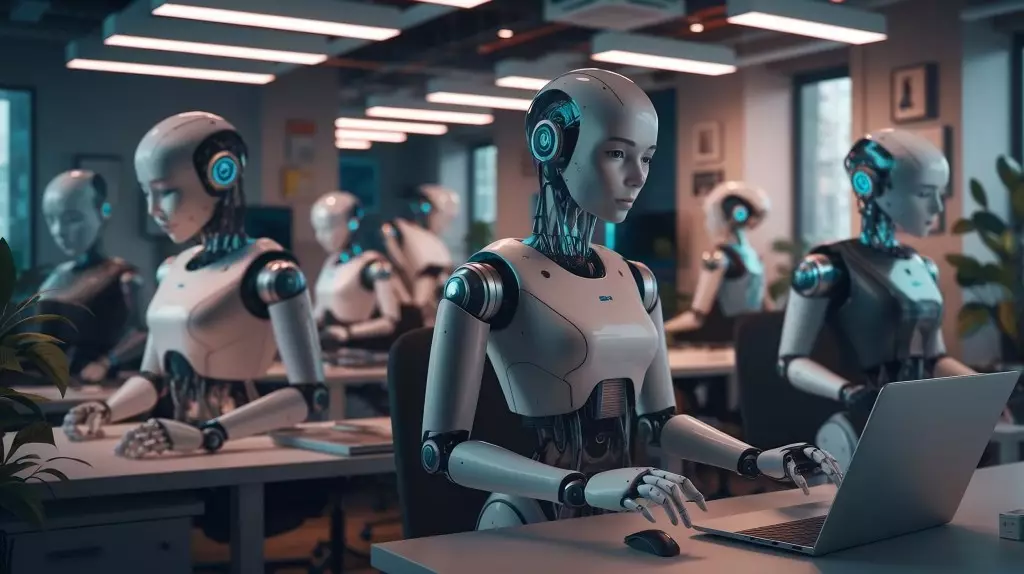For years, the narrative surrounding artificial intelligence in software development has been one of optimism. Advocates claim that AI will revolutionize productivity, allow developers to focus on higher-order problems, and ultimately usher in an era of innovation unbounded by tedious tasks. However, beneath this shiny veneer lies a harsher reality: AI’s encroachment on entry-level coding skills reveals fundamental flaws within the industry. It exposes how superficial growth—merely automating repetitive coding—may not address the core issues that have long hindered software development’s progression. In fact, the rapid automation of junior tasks threatens to intensify the industry’s structural weaknesses, risking a hollowed-out talent pipeline that prioritizes ephemeral productivity over genuine mastery.
The problem is not solely about replacing menial work; it fundamentally questions the industry’s traditional model of skill development. Historically, new entrants were expected to grind through basic coding, debugging, and troubleshooting—learning the nuances of systems through hands-on experience. AI’s ability to execute these tasks with minimal human input shifts the focus. What once was the foundation of professional growth now risks becoming obsolete, potentially leading newcomers to bypass essential learning stages. This superficial progression could create a workforce that understands only the surface of software, unable to navigate complex systems, think critically, or innovate beyond what AI can generate.
An Industry in Crisis: Talent, Tasks, and the Diminishing Human Element
The structural change AI introduces is not universally positive. It threatens to erode the traditional career ladder that propelled many developers from novices to architects. Tasks that once demanded deliberate practice and incremental learning—like debugging tricky issues, understanding system intricacies, and developing an intuition for scalable architecture—are being streamlined away. While efficiency might improve, it risks creating a generation of developers who lack a foundational understanding of the very systems they build. Without that deep-rooted knowledge, the risk of producing fragile, poorly designed software escalates.
Beyond individual skill stagnation, the entire ecosystem is experiencing a shift in team dynamics. Roles once clearly delineated—front-end specialists, back-end engineers, QA testers—are becoming blurred. AI’s versatility might condense these roles into hybrid functions, where one person manages multiple facets of development with AI support. While initially appealing through cost savings and speed, this transformation subtly undermines the depth of expertise that underpins sustained innovation. Lacking profound, specialized knowledge may lead to brittle decision-making and a reduced capacity to handle unforeseen challenges or complex integrations.
Moreover, there’s an underlying danger: with AI shouldering the manual, repetitive work, human judgment becomes even more critical—but also more compromised. The strategic oversight, ethical considerations, and creative problem-solving that define high-quality software development won’t be sufficiently cultivated if professionals only oversee AI-generated code without understanding it deeply. It’s a dangerous shortcut, potentially leading to a monoculture where AI-driven solutions are accepted uncritically, ignoring broader implications.
The Future Developer: From Coder to Strategist with a Technical Edge
The impending landscape demands a reevaluation of what it means to be a software professional. The “developer” of the future will need to transcend coding proficiency alone. Instead, they must become hybrids—part engineer, part designer, part strategist. Understanding user needs, business goals, and system-level thinking will be paramount. AI becomes less a tool for code generation and more a co-creator—one that requires human oversight rooted in foundational knowledge.
This shift is revealing some uncomfortable truths about the current education and training models. The emphasis on syntax and superficial coding exercises offers little in preparing developers for the strategic and integrative thinking that will dominate future workflows. Real mastery will likely come from those who can synthesize technical expertise with creativity and vision. Those individuals will be capable of steering AI tools, weaving together disparate systems, and making strategic decisions beyond mere code implementation.
However, this transition isn’t merely about skillset development; it also involves a cultural change. The industry must stop glorifying the “hackathon coder” who quickly juggles lines of code and start valuing holistic problem-solving abilities. Recognizing the limits of automation and understanding that technology alone cannot replace human insight is vital. Overzealous reliance on AI could lead to ethical lapses, security vulnerabilities, or misaligned product strategies—areas where human judgment remains irreplaceable.
Assessing the Impact: An Industry at a Crossroads
While automation appears to promise efficiency and reduced costs, it also risks exacerbating existing issues like talent hoarding at the top tiers of development and widening skill gaps. The tech industry’s obsession with speed and immediate results blinds many to the long-term consequences of devaluing foundational skills. Instead of fostering true innovation, the industry risks cultivating a superficial veneer of productivity—one that can be easily shattered when systems become too complex for AI to handle or when unforeseen challenges arise that require nuanced understanding.
Furthermore, the central concern should not be whether AI is capable of automating tasks but whether the industry nurtures developers capable of leveraging AI responsibly and strategically. It is this emphasis on human-AI collaboration that could either be the industry’s salvation or its downfall. Those who grasp the strategic importance of AI oversight and can articulate visions that go beyond mere code templating will be the real drivers of progress.
Looking ahead, the industry must confront the uncomfortable truth: the old paradigm of “learning to code” as a linear, foundational step is no longer sufficient. Instead, developers must evolve into multifaceted professionals, blending technical prowess with strategic thinking and ethical awareness. The challenge lies in reimagining education, career progression, and team structures—recognizing that automation amplifies the importance of human judgment, not diminishes it.
In this transforming landscape, the question remains: will the industry adapt with foresight and integrity, or will it succumb to the allure of short-term gains? The answer hinges on whether we can reframe talent development to prioritize depth over breadth, reflection over reflex, and strategic insight over blind automation.









Leave a Reply